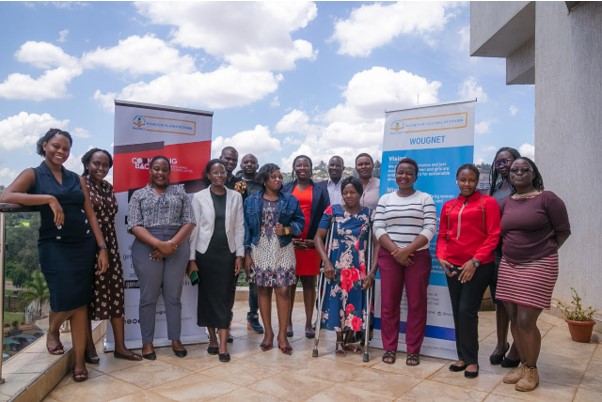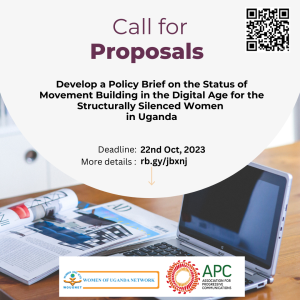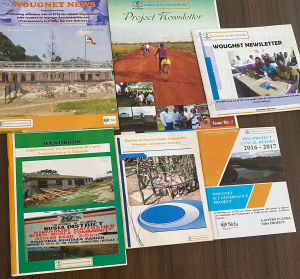Gender backlash persists as a significant issue in hindering the gains, achievements, and progress made on gender equality. This backlash encompasses various forms of pushback directed at feminist activists and Human Rights Defenders, including, but not limited to, the use of languages, phrases, and images that objectify women, strict regulation related to gender equality, reproductive rights, media misrepresentation, backlash against women in leadership and censorship of discussions on gender activism.
While the internet continues to serve as a vital tool for feminist organizations to counter backlash, there has been insufficient effort to ensure that communication platforms protect the freedom of speech, expression, and organizing online. Gender equality can only be achieved when we counter backlash and/or advocate for women’s rights governing feminists organizing online and shrinking civic spaces.
WOUGNET in partnership with the Institute of Development Studies (IDS), under the Countering Backlash program organised a two-day policy mapping workshop between 11th-12th September 2023 on Feminists Organising Online and Shrinking Civic Space aimed to strengthen the understanding of contextual features of gender backlash. During the workshops, we highlighted and showcased key backlash issues and cases, the nature of backlash, the roles of various actors, and counter-tactics in Uganda. We worked closely with women’s rights organizations, civil society, gender justice defenders, human rights activists, academia, and the media, among others, to change and improve the conditions of vulnerable groups in Uganda and, ultimately, counter backlash.
Shrinking Civic Space
The first day of the workshop delved into the pressing issue of the “shrinking civic space.” Shrinking civic space refers to the environment in which civil society operates. The civic space is characterized by increasing restrictions on the Freedom of Expression, Assembly, and Association which significantly infringes on the ability of Civil Society Organisations, WHRDs, and activists to carry out their work.
“Physical and virtual dynamics have been put in place where women are held back on expressing their rights and Freedom of Expression,” a feminist noted.
Around the world, civil society organizations continue to face challenges that threaten their existence and fundamental democratic principles. There is increasingly limited democratic space and influence for civil society, with restrictions in terms of legal and regulatory frameworks, and severe violence against human rights defenders who are demanding transparency, freedom, equality, and justice. This has negative implications for sustaining healthy democracies.
This phenomenon, which has global implications, was examined entirely from a Ugandan perspective during the workshop, emphasizing its effect on women human rights defenders, activists, and feminists, and this set the stage for an essential dialogue on safeguarding the space for civil society in Uganda.
Key Current Backlash Areas and Issues
1. Restrictions on Freedom of Assembly: The Ugandan government, on various occasions has enforced limitations on public gatherings and protests involving women, citing apprehensions regarding public order and safety. These constraints curtail the capacity of civil society groups and activists to coordinate and voice their concerns. For instance, Stella Nyanzi, a prominent Ugandan feminist, activist, and academic, faced legal action in 2018 due to her outspoken criticism of the government. She was known for her innovative forms of protest, including using poems online, and explicit art to draw attention to issues like women’s rights and political accountability.
2. Harassment and arrests of Activists: Activists advocating for various causes, including political reform, LGBTQ+ rights, and environmental conservation, have faced harassment and arrests. This includes arbitrary arrests, detention, and intimidation. Human rights lawyer Nicholas Opiyo was arrested in 2020 on charges of “money laundering”, which he and various human rights organizations viewed as politically motivated.
3. Repressive Media Regulations: The government has implemented regulations that restrict media freedom. These regulations have led to self-censorship among journalists and media houses, limiting their ability to report independently. The 2013 Press and Journalist Act (Amended) introduced stricter regulations on media organizations, leading to concerns about press freedom.
4. Internet shutdowns: The government of Uganda has resorted to internet shutdowns and social media restrictions during critical events such as elections and protests thus increasing online censorship and surveillance, limiting the freedom of expression and access to information. During the 2021 presidential elections, there was a nationwide internet shutdown, and access to social media platforms like Facebook and Twitter was blocked, affecting the free flow of information.
5. Legal Restrictions on Civil Society: Uganda has enacted laws and regulations that impose significant restrictions on non-governmental organizations (NGOs) and civil society groups. These laws give government authorities extensive control over the activities and funding of these organizations. The 2016 NGO Act introduced stringent registration and reporting requirements for NGOs, making it more difficult for them to operate independently and giving government authorities control over their activities.
Feminists Organizing Online
Feminist organizing refers to the efforts of women to explicitly challenge their subordination to men. In a rapidly evolving digital landscape, the internet has become a vital tool to amplify voices, advocate for change, and foster global solidarity. The second day of the workshop was dedicated to the digital realm, a powerful tool for feminists and activists to organize. It explored how women are utilizing the digital sphere to connect, advocate, and mobilize. The workshop aimed at empowering women to harness the potential of digital spaces in their advocacy and activism. We addressed the global trends in online feminist organizing and key issues that resonate with feminists in Uganda.
Worldwide, online feminist organizing has witnessed remarkable trends in recent years, reflecting the enduring spirit of women’s movements. The #MeToo movement brought issues of sexual harassment and assault into the global spotlight. It empowered women to share their stories and demand accountability. Such women-led campaigns have tackled diverse issues, from gender-based violence to reproductive rights. These campaigns leverage the reach of social media to mobilize support and drive change.
Challenges Faced by Feminists Organizing Online
1. Online Harassment and Threats: Feminist activists, such as Stella Nyanzi, have faced severe online harassment, including threats of violence and misogynistic abuse, due to their outspoken advocacy for gender equality and women’s rights.
2. Internet Shutdowns and Restrictions: During the 2021 presidential elections, the Ugandan government imposed a nationwide internet shutdown and restricted access to social media platforms, affecting activists’ ability to mobilize and share information.
3. Legal and Policy challenges: The Ugandan government has enacted laws and regulations that can be used to restrict freedom of expression and limit digital rights. The Public Order Management Act of 2013 and the Social Media Tax are examples of such laws.
4. Lack of Safe Space: Online platforms can be hostile environments for women activists, with cyberbullying and doxxing (the release of personal information) posing serious threats to their safety.
5. Digital Gender Divide: Women in rural areas often have limited access to the internet and digital devices, creating disparities in participation and engagement in online feminist movements.
Counter-tactics Against the Shrinking Civic Space and Feminists Organizing Online
- Ugandan Civil Society Organisations, in collaboration with international partners, can advocate for legal reforms to ensure that laws enacted do not
infringe on Freedom of Expression and Assembly. This can involve lobbying for amendment of repressive laws.
- Activists can document instances of online harassment and threats, and expose them to the public and relevant authorities. This can help hold oppressors accountable.
- When digital security is a concern, activists, feminists, and WHRDs can strategically resort to anonymity online to protect their identities while still participating in online feminist organizing.
- In response to internet shutdowns, feminists, activists, and WHRDs can employ the use of VPNs to access blocked websites and maintain their online presence.
Conclusion
The digital space has emerged as a powerful tool for feminist organizing, allowing voices to be heard even in the face of a shrinking civic space. However, this platform is not without its own set of challenges, from online harassment to digital illiteracy. Despite these adversities, feminist activists in Uganda continue to employ innovative strategies, forge collaborations, and champion causes that resonate with women’s rights, gender equality, and social justice.
Written by,
Irene Marunga Communications Associate






